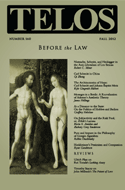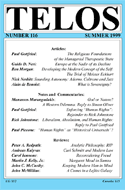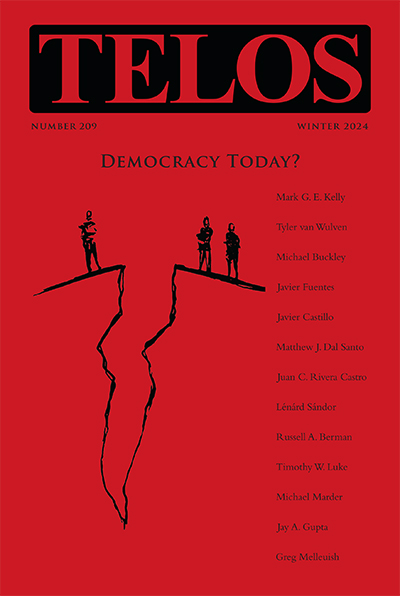Kevin S. Amidon and Zachary Gray Sanderson’s “On Subjectivity and the Risk Pool; or, Žižek’s Lacuna” appears in Telos 160 (Fall 2012). Read the full version online at the Telos Online website, or purchase a print copy of the issue here.
 In his In Defense of Lost Causes, Slavoj Žižek poses more than a few heavy-gauge questions. Foremost among them: “The only true question today is: do we endorse this ‘naturalization’ of capitalism, or does contemporary global capitalism contain antagonisms which are sufficiently strong to prevent its infinite reproduction?” Žižek’s analysis of this question, however, seems to us to be missing a crucial element. Where Žižek seems to posit a kind of reconvergence of the classical autonomous subject of the (neo-)liberal (and Frankfurt School) traditions with the class-based vocabulary of more radical Marxist and Lacanian analyses, we see another layer: the subject under the condition of the risk pool. The risk pool, protean and ubiquitous in today’s political economy, takes form in those meta-structures of institutionalized financial, political, and medical (i.e. bio-political) insurance and quasi-insurance that do not so much control the subject’s spheres of activity as regulate them. The (voluntarily or involuntarily) risk-pooled human being is thus in many ways neither subject nor class. She is always both, and navigating always between them in the sphere of financially and actuarially mediated risk. Such navigation in many ways evacuates the forms of political agency posited in both liberal and Marxist traditions, and focuses the individual centrally on the problem of uncertainty. Žižek’s complex analyses of topics as diverse as terrorism and Christianity approach reflections like these, but end where they must in fact begin. In his In Defense of Lost Causes, Slavoj Žižek poses more than a few heavy-gauge questions. Foremost among them: “The only true question today is: do we endorse this ‘naturalization’ of capitalism, or does contemporary global capitalism contain antagonisms which are sufficiently strong to prevent its infinite reproduction?” Žižek’s analysis of this question, however, seems to us to be missing a crucial element. Where Žižek seems to posit a kind of reconvergence of the classical autonomous subject of the (neo-)liberal (and Frankfurt School) traditions with the class-based vocabulary of more radical Marxist and Lacanian analyses, we see another layer: the subject under the condition of the risk pool. The risk pool, protean and ubiquitous in today’s political economy, takes form in those meta-structures of institutionalized financial, political, and medical (i.e. bio-political) insurance and quasi-insurance that do not so much control the subject’s spheres of activity as regulate them. The (voluntarily or involuntarily) risk-pooled human being is thus in many ways neither subject nor class. She is always both, and navigating always between them in the sphere of financially and actuarially mediated risk. Such navigation in many ways evacuates the forms of political agency posited in both liberal and Marxist traditions, and focuses the individual centrally on the problem of uncertainty. Žižek’s complex analyses of topics as diverse as terrorism and Christianity approach reflections like these, but end where they must in fact begin.
Continue reading →
By Alwin Franke · Friday, November 11, 2011 As an occasional feature on TELOSscope, we highlight a past Telos article whose critical insights continue to illuminate our thinking and challenge our assumptions. Today, Alwin Franke looks at Ben Morgan’s “Developing the Modern Concept of the Self: The Trial of Meister Eckhart,” from Telos 116 (Summer 1999).
 All subjectivization is a matter of drawing borders; a history of the subject is a history of the borders drawn to produce the self. Such a history of the borders, as suggested by Foucault, implies an investigation of both its sides—positivity and negativity. To write history, then, means to awaken the contemporary element in the historical, to construct constellations in which the present and the past enter into a state of sympathetic interdependence. Negativity, here, allows for the creation of counter-discourse. However, the relationship between positivity and negativity has been made all the more complex over the past decades. The borders have always been crossed indeed, but in the age of new capitalism we witness a constant blurring and redrawing of borders that allow for the incorporation of negativity into the system itself. All subjectivization is a matter of drawing borders; a history of the subject is a history of the borders drawn to produce the self. Such a history of the borders, as suggested by Foucault, implies an investigation of both its sides—positivity and negativity. To write history, then, means to awaken the contemporary element in the historical, to construct constellations in which the present and the past enter into a state of sympathetic interdependence. Negativity, here, allows for the creation of counter-discourse. However, the relationship between positivity and negativity has been made all the more complex over the past decades. The borders have always been crossed indeed, but in the age of new capitalism we witness a constant blurring and redrawing of borders that allow for the incorporation of negativity into the system itself.
Continue reading →
By Kevin S. Amidon · Friday, March 11, 2011 This paper was presented at the 2011 Telos Conference, “Rituals of Exchange and States of Exception: Continuity and Crisis in Politics and Economics.”
 Slavoj Žižek poses more than a few heavy-gauge questions in his In Defense of Lost Causes. Foremost among them, at the beginning of chapter nine: “The only true question today is: do we endorse this ‘naturalization’ of capitalism, or does contemporary global capitalism contain antagonisms which are sufficiently strong to prevent its infinite reproduction?” (421). This vast question—as well as its possible answers—develops in many ways out of the discussion in the previous chapter of the book, in which Žižek approaches Alain Badiou’s concepts of subtraction and the Event with his usual copious verve, as well as with substantial concern that Badiou’s “subtraction” means that one might have the capacity to stand “outside” the “state form,” but only in a way that is “not destructive of the state form” (402). Žižek thus concludes that Badiou has Slavoj Žižek poses more than a few heavy-gauge questions in his In Defense of Lost Causes. Foremost among them, at the beginning of chapter nine: “The only true question today is: do we endorse this ‘naturalization’ of capitalism, or does contemporary global capitalism contain antagonisms which are sufficiently strong to prevent its infinite reproduction?” (421). This vast question—as well as its possible answers—develops in many ways out of the discussion in the previous chapter of the book, in which Žižek approaches Alain Badiou’s concepts of subtraction and the Event with his usual copious verve, as well as with substantial concern that Badiou’s “subtraction” means that one might have the capacity to stand “outside” the “state form,” but only in a way that is “not destructive of the state form” (402). Žižek thus concludes that Badiou has
Continue reading →
|
|
 In his In Defense of Lost Causes, Slavoj Žižek poses more than a few heavy-gauge questions. Foremost among them: “The only true question today is: do we endorse this ‘naturalization’ of capitalism, or does contemporary global capitalism contain antagonisms which are sufficiently strong to prevent its infinite reproduction?” Žižek’s analysis of this question, however, seems to us to be missing a crucial element. Where Žižek seems to posit a kind of reconvergence of the classical autonomous subject of the (neo-)liberal (and Frankfurt School) traditions with the class-based vocabulary of more radical Marxist and Lacanian analyses, we see another layer: the subject under the condition of the risk pool. The risk pool, protean and ubiquitous in today’s political economy, takes form in those meta-structures of institutionalized financial, political, and medical (i.e. bio-political) insurance and quasi-insurance that do not so much control the subject’s spheres of activity as regulate them. The (voluntarily or involuntarily) risk-pooled human being is thus in many ways neither subject nor class. She is always both, and navigating always between them in the sphere of financially and actuarially mediated risk. Such navigation in many ways evacuates the forms of political agency posited in both liberal and Marxist traditions, and focuses the individual centrally on the problem of uncertainty. Žižek’s complex analyses of topics as diverse as terrorism and Christianity approach reflections like these, but end where they must in fact begin.
In his In Defense of Lost Causes, Slavoj Žižek poses more than a few heavy-gauge questions. Foremost among them: “The only true question today is: do we endorse this ‘naturalization’ of capitalism, or does contemporary global capitalism contain antagonisms which are sufficiently strong to prevent its infinite reproduction?” Žižek’s analysis of this question, however, seems to us to be missing a crucial element. Where Žižek seems to posit a kind of reconvergence of the classical autonomous subject of the (neo-)liberal (and Frankfurt School) traditions with the class-based vocabulary of more radical Marxist and Lacanian analyses, we see another layer: the subject under the condition of the risk pool. The risk pool, protean and ubiquitous in today’s political economy, takes form in those meta-structures of institutionalized financial, political, and medical (i.e. bio-political) insurance and quasi-insurance that do not so much control the subject’s spheres of activity as regulate them. The (voluntarily or involuntarily) risk-pooled human being is thus in many ways neither subject nor class. She is always both, and navigating always between them in the sphere of financially and actuarially mediated risk. Such navigation in many ways evacuates the forms of political agency posited in both liberal and Marxist traditions, and focuses the individual centrally on the problem of uncertainty. Žižek’s complex analyses of topics as diverse as terrorism and Christianity approach reflections like these, but end where they must in fact begin.  All subjectivization is a matter of drawing borders; a history of the subject is a history of the borders drawn to produce the self. Such a history of the borders, as suggested by Foucault, implies an investigation of both its sides—positivity and negativity. To write history, then, means to awaken the contemporary element in the historical, to construct constellations in which the present and the past enter into a state of sympathetic interdependence. Negativity, here, allows for the creation of counter-discourse. However, the relationship between positivity and negativity has been made all the more complex over the past decades. The borders have always been crossed indeed, but in the age of new capitalism we witness a constant blurring and redrawing of borders that allow for the incorporation of negativity into the system itself.
All subjectivization is a matter of drawing borders; a history of the subject is a history of the borders drawn to produce the self. Such a history of the borders, as suggested by Foucault, implies an investigation of both its sides—positivity and negativity. To write history, then, means to awaken the contemporary element in the historical, to construct constellations in which the present and the past enter into a state of sympathetic interdependence. Negativity, here, allows for the creation of counter-discourse. However, the relationship between positivity and negativity has been made all the more complex over the past decades. The borders have always been crossed indeed, but in the age of new capitalism we witness a constant blurring and redrawing of borders that allow for the incorporation of negativity into the system itself.  Slavoj Žižek poses more than a few heavy-gauge questions in his In Defense of Lost Causes. Foremost among them, at the beginning of chapter nine: “The only true question today is: do we endorse this ‘naturalization’ of capitalism, or does contemporary global capitalism contain antagonisms which are sufficiently strong to prevent its infinite reproduction?” (421). This vast question—as well as its possible answers—develops in many ways out of the discussion in the previous chapter of the book, in which Žižek approaches Alain Badiou’s concepts of subtraction and the Event with his usual copious verve, as well as with substantial concern that Badiou’s “subtraction” means that one might have the capacity to stand “outside” the “state form,” but only in a way that is “not destructive of the state form” (402). Žižek thus concludes that Badiou has
Slavoj Žižek poses more than a few heavy-gauge questions in his In Defense of Lost Causes. Foremost among them, at the beginning of chapter nine: “The only true question today is: do we endorse this ‘naturalization’ of capitalism, or does contemporary global capitalism contain antagonisms which are sufficiently strong to prevent its infinite reproduction?” (421). This vast question—as well as its possible answers—develops in many ways out of the discussion in the previous chapter of the book, in which Žižek approaches Alain Badiou’s concepts of subtraction and the Event with his usual copious verve, as well as with substantial concern that Badiou’s “subtraction” means that one might have the capacity to stand “outside” the “state form,” but only in a way that is “not destructive of the state form” (402). Žižek thus concludes that Badiou has 

